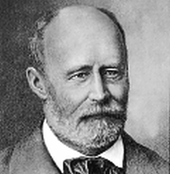- Didascalia Apostolorum
-
- "Didascalia" redirects here. For the collection of ancient theatre notices, see Didascaliae.
Didascalia Apostolorum (or just Didascalia) is a Christian treatise which belongs to genre of the Church Orders. It presents itself as being written by the Twelve Apostles at the time of the Council of Jerusalem, however, scholars agree that it was actually a composition of the 3rd century CE, perhaps around 230 CE.[1]
The Didascalia was clearly modeled on the earlier Didache.[2] The author is unknown, but he was probably a bishop. The provenience is usually regarded as Northern Syria, possibly near Antioch.[3]
Contents
Manuscript Tradition
 Paul de Lagarde, who first re-discovered the Didascalia
Paul de Lagarde, who first re-discovered the Didascalia
The earliest mention of the work is by Epiphanius of Salamis, who believed it to be truly Apostolic. He found it in use among the Audiani, Syrian heretics. The few extracts Epiphanius gives do not quite tally with our present text, but he is notoriously inexact in his quotations. At the end of the fourth century the Didascalia was used as the basis of the first six books of the Apostolic Constitutions. At the end of the 4th century it is quoted in the Pseudo-Chrysostom's Opus Imperfectum in Matthaeum. But the Didascalia never had a great vogue, and it was superseded by the Apostolic Constitutions.
The Didascalia Apostolorum, whose lost original was in Greek, was first published in 1854 in Syriac by Paul de Lagarde. In 1900 Edmund Hauler published the Verona Palimpsest which includes a Latin translation of the Didascalia, perhaps of the fourth century, more than half of which has perished. In 1906 Franz Xaver von Funk published the texts, printed side by side, of both the Didascalia and the Apostolic Constitutions, in order to show the similarities.[4] A short fragment of chapter 15 has been found in Greek, and in 1996 an other probable fragment in Coptic.[2]
Contents
The Latin title Didascalia Apostolorum means "Teaching of the Apostles" and the full title given in Syriac is: "Didascalia, that is, the teaching of the twelve Apostles and the holy disciples of our Lord". The text, as typical of Ancient Church Orders, is badly put together, without logic, but not without some good sense. It never touches upon dogma but concerns itself entirely with practice. In comparison with the Didache, the Didascalia moved the main focus from the moral issues to liturgical practice and church organization.
The content can be so summarized:
- Admonitions about Christian life, prayer, orphans, martyrdom (chapters 1-3, 13, 17, 19-20)
- Rules about bishops' qualifications, conduct, duties, alms (chapters 4-11, 18)
- Rules about male and female deacons and widows (chapters 14-16)
- Liturgical rules about the proper place in the church-building and about fasting (chapters 12, 21)
- The education of children and the denouncement of heresy (chapters 22-23)
- The claim of the composition of the treatise by the Twelve Apostles and the refuse of the Jewish ritual practices (chapter 24-26)
The church officials are bishops, deacons, priests, widows (and orphans); deaconesses are also added, in one place rectors, and once subdeacons (these last may have been interpolated). Especially noticeable is the treatment which bishops are ordered to give to penitents. Even great sinners, on repentance, are to be received with kindness, no sins are excepted. The canonical penance is to be of two to seven weeks.
The heresies mentioned are those of Simon Magus and Cleobius (this name is given also by Hegesippus), with Gnostics and Ebionites. Against these, Christians must believe in the Trinity, the Scriptures and the Resurrection. The original Law of Moses (specifically the Ten Commandments) is to be observed, but not the Talmudic Second Law, Mishnah, which was given to the Jews on account of the hardness of their hearts. In addition, the Sabbath rest is given a symbolic content, and the Christians are admonished to instead treat every day as belonging to the Lord, but not to keep the rest literally.
The Old Testament is frequently quoted, and often at great length. The Gospel is cited by name, usually that of Matthew, the other evangelists less often, and that of John least of all. The Acts of the Apostles and nearly all the Epistles are freely employed, including the Epistle to the Hebrews, but the Apocalypse is not cited. None of these could be named. Besides the Didache, the Didascalia utilizes also other ancient Christian documents as the Acts of Paul and the Gospel of Peter.[3]
Notes
- ^ Woolfenden, Gregory W. (2004). Daily liturgical prayer: origins and theology. Ashgate Publishing. pp. 26. ISBN 9780754616016.
- ^ a b Bradshaw, Paul F. (2002). The Search for the Origins of Christian Worship. Oxford University Press. pp. 78–80. ISBN 9780195217322. http://books.google.com/books?id=R7kWzG_dggQC.
- ^ a b Johnson, Lawrence J. (2009). Worship in the Early Church: An Anthology of Historical Sources. Vol 1. Liturgical Press. p. 224. ISBN 9780814661970.
- ^ Didascalia et Constitutiones Apostolorum, ed. F. X. Funk (2 vols. Paderborn, 1906).
See also
External links
- English translation
- Early Christian Writings: Didascalia
- The Didascalia apostolorum in English Google Books
 This article incorporates text from a publication now in the public domain: Herbermann, Charles, ed (1913). "Didascalia Apostolorum". Catholic Encyclopedia. Robert Appleton Company.Categories:
This article incorporates text from a publication now in the public domain: Herbermann, Charles, ed (1913). "Didascalia Apostolorum". Catholic Encyclopedia. Robert Appleton Company.Categories:- Ancient Church Orders
- Syriac literature
- Anti-Gnosticism
- New Testament apocrypha
- Greek loanwords
- 3rd-century Christian texts
Wikimedia Foundation. 2010.
